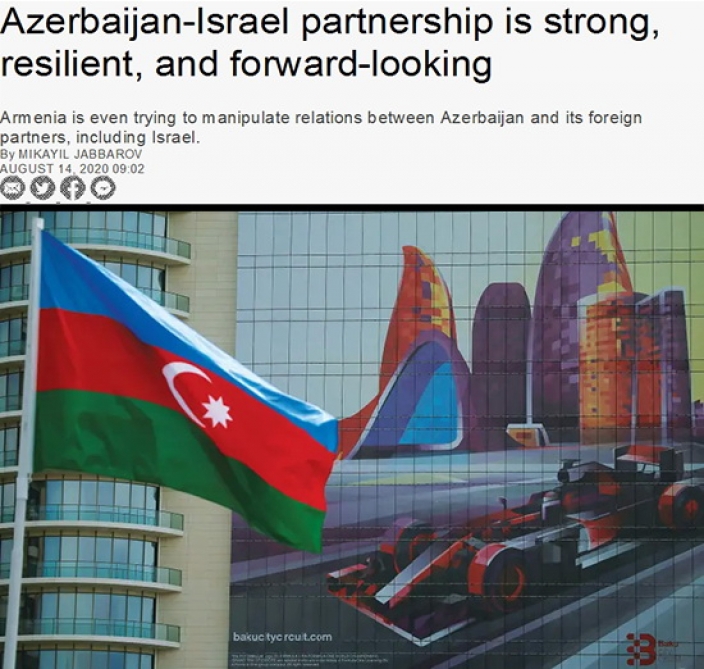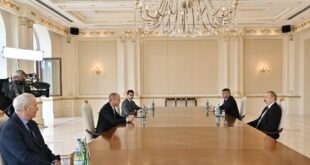
The Jerusalem Post newspaper has published an article by Azerbaijan’s Minister of Economy, co-chair of Azerbaijan-Israel intergovernmental commission Mikayil Jabbarov.
Headlined “Azerbaijan-Israel partnership is strong, resilient, and forward-looking”, the article reads:
“As a co-chair of the Azerbaijan-Israel intergovernmental commission, I was honored to visit Israel for the commission’s inaugural session on May 14, 2018. I specifically asked that my visit start at the Yad Vashem Holocaust Remembrance Center.
The tour of the Center left a deep impact on my memory. It helped me better understand the tragic story of the Holocaust and draw certain parallels with recent history of my nation, which also face genocide, ethnic cleansing and hate crime.
The world lives through the most difficult period in our modern history. The COVID-19 pandemic has changed our familiar life pattern. It is claiming thousands of victims every day. It is undermining economic and social pillars of international order, enlarging poverty and slowing development.
In these hard days, Azerbaijan is facing yet another security challenge. As if not satisfied with occupation of the Nagorno-Karabakh region and 7 adjacent districts of Azerbaijan, on July 12 the neighboring Republic of Armenia launched a new large-scale military attack against our country.
The attack came in the Tovuz district, which is quite far from the Nagorno-Karabakh conflict zone. Interestingly, the Tovuz district is located on transit route of key oil and gas pipelines, which carry Azerbaijan’s hydrocarbons to the world markets. Thus, Armenia’s aggressive actions present a grave danger to stability of the world energy markets and threaten energy security of Azerbaijan’s energy consumers, including Israel.
Another reason for Armenia’s provocative move has to do with domestic situation. Armenia’s economy is in deep trouble. Corruption is wide-spread. Emigration is rising. Response to the pandemic is mismanaged. Political situation is unstable, with society divided and elite groups fighting each other. In this light, Armenia’s government chose a familiar way of distracting people’s attention from domestic troubles to foreign conquest.
The recent military attack also pursues a goal of undermining an already fragile peace process, so Armenia can indefinitely continue its occupation of Azerbaijan’s territory.
What is even more appalling is that Armenia is taking its aggression to truly global scale. In the past ten days Azerbaijani communities across the globe tried to hold peaceful rallies in moral support to their homeland. In most cases, from Los Angeles to Brussels and from Ottawa to London, they were faced with angry mobs of Armenian radical nationalists. Azerbaijani demonstrators were subjected to verbal and then physical assaults, beatings and stonings.
Time and again we see that instead of calm discussion at the negotiation table based on facts and legal arguments, the Armenian side resorts to military aggression, violence and hate crime.
Now Armenia is even trying to manipulate relations between Azerbaijan and its foreign partners, including Israel. Promoting publications in Israeli media, the Armenian propaganda is calling for an end to relations with Azerbaijan through sanctions, embargoes and boycotts.
I am confident that Armenian arguments will not fly in Israeli society as the Jewish nation is well aware of the realities on the ground. Azerbaijan has always been a meeting place of civilizations and crossroad of trade routes. This explains our tradition of tolerance of others and respect for their beliefs. Azerbaijan is home to an old Jewish community, which never experienced anti-Semitism. Jewish MPs serve in our Parliament and Jewish soldiers shed blood for their homeland’s flag.
Unlike Armenia, we are not trying to manipulate our partners’ agenda. While developing bilateral ties with Israel, we in Azerbaijan are not focusing these ties against third parties. Our efforts are always focused on providing solid contribution to international security, stability and peace. We are trying to promote culture of tolerance and mutual respect. We want to help build bridges instead of walls and the relationships we have pioneered are benefiting our friends already.”
 Oval Useful news from Azerbaijan and Caucasus
Oval Useful news from Azerbaijan and Caucasus


